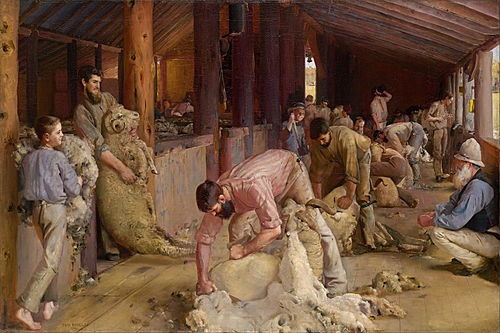Click Go the Shears

"Click Go the Shears" is a traditional Australian country song. The song details a day's work for a sheep shearer in the days before machine shearing.
Song
The enduring popularity of the song reflects the traditional role that the wool industry has played in Australian life. The song describes the various roles in the shearing shed, including the "ringer", the "boss of the board", the "colonial experience man" and the "tar boy". After the day's shearing, the "old shearer" takes his cheque and heads to the local pub for a drinking session.
The tune is from the American Civil War song "Ring the Bell, Watchman", by Henry Clay Work, and the first verse follows closely, in parody, Work's lyrics as well. It was originally named "The Bare Bellied Ewe", and only became popular in the 1950s, more than half a century later.

The second verse in the original 19th-century song is as follows:
The usual chorus of the song is as follows:
In June 2013, folklorist Mark Gregory discovered that a version of the song was first published in 1891 in the regional Victorian newspaper the Bacchus Marsh Express under the title "The Bare Belled Ewe" and the tune given as "Ring the Bell Watchman." That version was signed "C. C. Eynesbury, Nov. 20, 1891," Eynesbury being a rural property in the Bacchus Marsh area. It is possible that "C.C." was the author of the song.
There was a shearers' strike in 1891 so the publication of the song in that year would have resonated with the Australian community.
The song was next published in 1939 in two Australian newspapers and then, in 1946, as a traditional song "collected and arranged" by musicologist the Reverend Dr Percy Jones. The lyrics vary widely: "bare-bellied yoe" (yoe is a dialect word for ewe) is often "bare-bellied joe" or even "blue-bellied ewe". The last line in the verse about the "colonial experience" man "smelling like a whore" is often bowdlerised to "smelling like a sewer" or completely rewritten.
The song has been recorded by many artists, notably in 1952 by the American folk musician Burl Ives, for his album Australian Folk Songs. Other versions were recorded by the British folklorist A. L. Lloyd in 1956 and American singer William Clauson in 1958. In January 2014, Chloe and Jason Roweth sang the 1891 version of the song for an ABC TV story.
When Australia replaced the pound with the dollar in 1966, a jingle that accompanied the changover was written to the same tune:
In 1973, when Gough Whitlam, the then Australian Prime Minister, visited the People's Republic of China, "Click Go the Shears" was played through loudspeakers along the route of the Prime Minister's motorcade from Peking International Airport to his hotel.
In 1988, Australian-British singer Olivia Newton-John included the song in her Olivia Down Under television special.